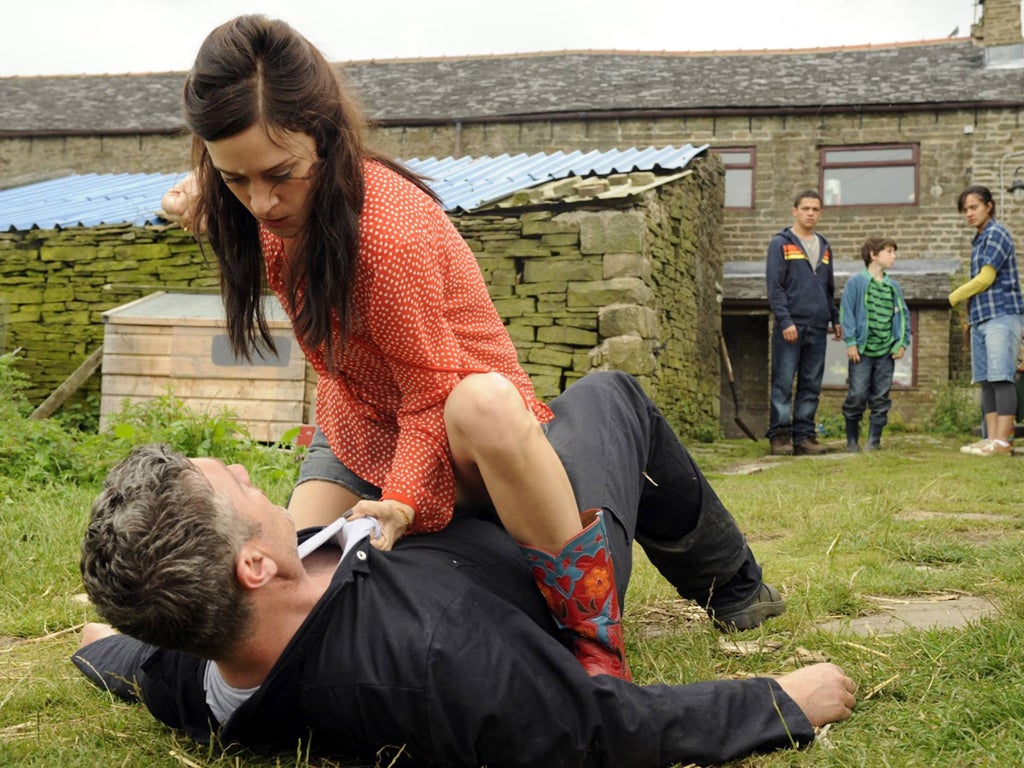Hit & Miss, Sky Atlantic, Tuesday Harlots, Housewives and Heroines: a 17th-Century History for Girls, BBC4, Tuesday
Can a pre-op transsexual hit-man also be a good mum? Dilemmas don't get more modern than this

Your support helps us to tell the story
From reproductive rights to climate change to Big Tech, The Independent is on the ground when the story is developing. Whether it's investigating the financials of Elon Musk's pro-Trump PAC or producing our latest documentary, 'The A Word', which shines a light on the American women fighting for reproductive rights, we know how important it is to parse out the facts from the messaging.
At such a critical moment in US history, we need reporters on the ground. Your donation allows us to keep sending journalists to speak to both sides of the story.
The Independent is trusted by Americans across the entire political spectrum. And unlike many other quality news outlets, we choose not to lock Americans out of our reporting and analysis with paywalls. We believe quality journalism should be available to everyone, paid for by those who can afford it.
Your support makes all the difference.The premise of Hit & Miss – a transsexual hit (wo)man finds she's fathered a son with her ex-girlfriend, now dying of cancer – is not only an original one, but one that's been well publicised. Thankfully, the first episode gets on with the exposition brusquely: here's Mia, our pre-op transsexual assassin, dispatching someone with cold, unglamorous efficiency; now she's applying lipstick in the mirror, because she is a glamorous lay-dee after all. We get some would-be gratuitous nude shots of offbeat Hollywood star Chloë Sevigny (playing Mia, with a dodgy Irish accent) ... except that there's a penis hanging between her legs, for clarification.
The drama is created by Paul Abbott, so off we trot to some god-forsaken farm on the moors in the north of England, where four bereaved children await – their mum, Mia's ex, has died already, so she's now the guardian. The kids – two slightly wooden teens, two insanely adorable little 'uns – are feral but semi-functional. They're as bolshy, suspicious, fond of saying "fuck" and unfond of the sosh (social services) as any of the characters in Abbott's Shameless.
There are also flashes of his dry humour in the script, even if it's technically written by Sean Conway. But overall it has a rather more languorous pace than Shameless or State of Play. It's beautifully filmed – there are almost painterly long-shots of the moors, and a claustrophobic tendency to crop in on close-ups. People are seen reflected in mirrors, through windows, or framed by railings. There's even a woozy karaoke scene that's positively Lynchian.
There's also some toe-curlingly brutal violence. And quite rightly so – the risk is that the hit-man thing becomes just a quirk, an amusing side-note. Mia's dilemma – can she be a contract killer and help raise a family? – should feel difficult, and a moment of vicious violence reminds you of that. It also stops Hit & Miss becoming a chirpily saccharine hymn to unconventional family values. This first episode doesn't quite find its rhythm, but that intriguing premise begins to be interestingly explored, so one to persevere with.
A new series on BBC4 was also delving into what it means to be a woman. It was oddly titled Harlots, Housewives and Heroines: a 17th-Century History for Girls – why "for girls"? Is it designed for GCSE history lessons at a ladies' college?
Well, there is something jolly hockey sticks about its presenter, historian Dr Lucy Worsley. She's endearingly eager, game for dressing up, dancing and reading naughty books by the likes of Restoration rake (and total filth-bag) the Earl of Rochester. She may have a cute bob, cute cardies, and a cute lisp, but she's also happy to announce that Charles II "had a big one".
And she's positively fist-pumping about how women came out of the margins of history during the Restoration. The 1660s was the time of the mistress: Charles II had 13, and some became very influential. This was a chance for a woman to gain independent means: a royal mistress could expect to be bankrolled up to the equivalent of £10m by the Treasury.
There is some acknowledgement that mistressing isn't exactly the height of female emancipation, with Worsley querying if this is "empowerment or a new form of exploitation?" But in all the fun of swirling round palaces and revelling in the sexy naughtiness of the new licentious court, there's little real interrogation. The conclusion seems to be: at least it was larkier than being a Puritan.
"Wanting all your clothes to fall off is hardly the ultimate expression of girl power," Worsley points out, while draped in the 17th-century equivalent of a negligee. True, but then, the late 20th-century concept of "girl power" was hardly the ultimate expression of feminism either. This was an enjoyably sumptuous swish through the royal Restoration court, but perhaps a little too, well, girly.
Join our commenting forum
Join thought-provoking conversations, follow other Independent readers and see their replies
Comments